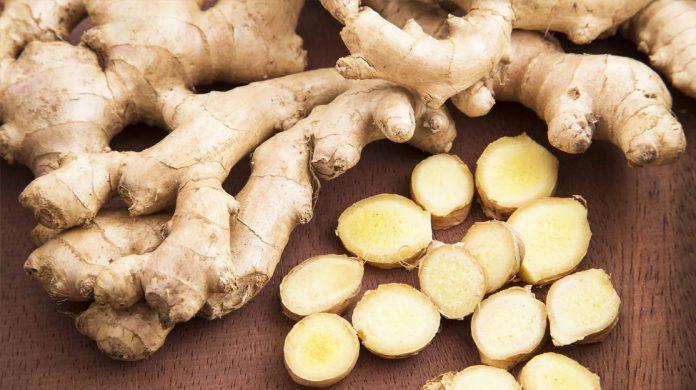Ginger may have numerous health benefits due to its anti-inflammatory, anti-nausea, and other properties. It may help you lose weight, manage arthritis, reduce menstrual symptoms, and more.
Ginger comes from a flowering plant originating in Southeast Asia. It adds flavor to sweet and savory foods and has a range of health benefits. It belongs to the Zingiberaceae family, and it’s closely related to turmeric, cardamom, and galangal.
The rhizome (underground part of the stem) is the part commonly used as a spice. It’s often called ginger root or simply ginger.
You can use ginger fresh, dried, powdered, or as an oil or juice. It features in many recipes as well as processed foods, home remedies, and cosmetics.
Contains gingerol, which has potent medicinal properties
Ginger has a long history of use in various forms of traditional and alternative medicine. It’s been used to aid digestion, reduce nausea, and help fight the flu and common cold, to name a few of its purposes.
The unique fragrance and flavor of ginger come from its natural oils, the most important of which is gingerol.
Gingerol is the main bioactive compound in ginger. It’s responsible for many of ginger’s medicinal properties.
Gingerol has powerful anti-inflammatory and antioxidant effects, according to researchTrusted Source. For instance, it may help reduce oxidative stress, which results from having too many free radicals in the body.
Can treat morning sickness and other forms of nausea
Ginger may be effectiveTrusted Source against nausea, including pregnancy-related nausea, commonly known as morning sickness.
Ginger may help relieve nausea and vomiting for people undergoing certain types of surgery, and it may also help reduce chemotherapy-related nausea.
While generally safe, it’s best to talk with a doctor before taking large amounts if you’re pregnant.
Ginger may not be suitableTrusted Source during pregnancy for people who are close to labor and those with a history of pregnancy loss or vaginal bleeding. It may also be unsuitable for those with clotting disorders.
May help with weight loss
Ginger may play a role in weight loss, according to studies in humans and animals.
One 2019 reviewTrusted Source concluded that ginger supplementation significantly reduced body weight, the waist-hip ratio, and the hip ratio in people with overweight or obesity.
Ginger’s ability to influence weight loss may be due to certain mechanisms, such as its potential to reduce inflammation.
Can help treat chronic indigestion
Ginger may help manage indigestion by speeding up the passage of food through the stomach.
Functional dyspepsia is when a person has indigestion — with symptoms such as abdominal pain, bloating, feeling too full, belching, and nausea — for no clear reason. It often occurs with irritable bowel syndrome (IBS).
In one study, scientistsTrusted Source found that consuming a ginger and artichoke preparation before eating a main meal significantly improved the symptoms of indigestion in people with functional dyspepsia, compared with taking a placebo.
May reduce menstrual pain
Ginger may help relieve dysmenorrhea, also known as menstrual pain.
Some research has suggested that ginger is more effective than acetaminophen/caffeine/ibuprofen (Novafen) in relieving menstrual pain.
However, more studies are needed.
May help lower cholesterol levels
High levels of LDL (bad) cholesterol are linked toTrusted Source an increased risk of heart disease.
In a 2022 reviewTrusted Source of 26 trials, researchers found that ginger consumption significantly reduced triglycerides and LDL cholesterol, while increasing HDL cholesterol. Even doses less than 1,500 mg per day were effective.
However, it may be hard to include such high doses of ginger in your diet, particularly if you don’t like the taste of ginger.
May help reduce cancer risk
Ginger may have anticancer properties due to gingerol and various other antioxidant and anti-inflammatory compounds.
There is some evidenceTrusted Source that these compounds may help reduce the risk of gastrointestinal cancers, such asTrusted Source colorectal, pancreatic, and liver cancer.
In one studyTrusted Source, 20 people with a high risk of colorectal cancer took 2 g of ginger daily for 28 days. At the end of the study, the lining of the participant’s intestines showed fewer cancer-like changes than expected.
However, most studies relating to ginger and cancer risk have not involved humans.
Credit: healthline.com









